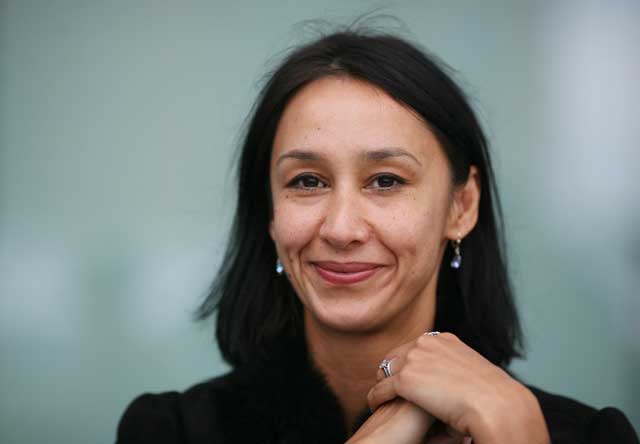Ethnic fixation is shackling bright new writers; Week in Books

Your support helps us to tell the story
From reproductive rights to climate change to Big Tech, The Independent is on the ground when the story is developing. Whether it's investigating the financials of Elon Musk's pro-Trump PAC or producing our latest documentary, 'The A Word', which shines a light on the American women fighting for reproductive rights, we know how important it is to parse out the facts from the messaging.
At such a critical moment in US history, we need reporters on the ground. Your donation allows us to keep sending journalists to speak to both sides of the story.
The Independent is trusted by Americans across the entire political spectrum. And unlike many other quality news outlets, we choose not to lock Americans out of our reporting and analysis with paywalls. We believe quality journalism should be available to everyone, paid for by those who can afford it.
Your support makes all the difference.A few years ago, a friend organised a conference for British-Asian writers to talk about why they wrote and whether “British-Asian writing” as a genre was felt to be a boon or burden. The first discussion brought thundering divisions when half the room insisted that ethnicity had nothing to do with it, while the other half argued that cultural identity couldn’t be divorced from creativity.
The colour-blind camp echoed those female writers who argue for the same gender neutrality as their male counterparts, whose sex is rarely conflated with the subject matter of their fictions. Those who claimed that there was no escaping ethnicity, even if this expressed itself in the “outsider’s gaze”, were also compelling. More so when I flicked though the excerpts that these writers had submitted for reading. Most of the stories featured village life or immigrant experience.
The same friend who organised the conference had edited an anthology of new writing called Too Asian, Not Asian Enough. It’s a title that sums up the catch-22 contradictions and circularities in the debate around diasporic fiction, which raises its head again as several young writers speak out about “ethnic and cultural pigeonholing” to The Bookseller – of being marketed as “ethnic” writers and encouraged to write about “back home”. The British-Turkish poet Chimene Suleyman’s rejoinder to this is a good one – “Finchley isn’t very interesting” – yet she does feel it is “almost impossible” not to write about ethnicity: “write what you know about, right?”
What is in question here, I think, is not what she writes about so much as the larger machinery of marketing, editing and possibly “exoticising” that attaches itself to her, pre-publication. Suleyman speaks of a “white voice” used to edit work of non-white authors, which sounds much more invasive then supplying superficial signposting that clarifies to Western readers what a dupatta or a roti might be. The suggestion is that the editing process muffles the original voice.
There are those who began their careers as writers of “difference”, such as Zadie Smith and Monica Ali, both dramatising the immigrant experience; and while they have extended their fictional worlds beyond stories of diversity, not everyone is able to break free of the invisible bars that marketing departments – or we readers – erect around some writers. Even the transition for Ali – celebrated for Brick Lane, not so celebrated for her fictionalised life of Princess Diana (Untold Story) – has not been seamless. Is this because Ali wrote a better book about ethnicity or because we regard this as a more “authentic” subject for her?
Pigeonholing doesn’t just apply to race, of course. Writers have long complained of the confining spaces that marketing departments can place them in. Some adopt pseudonyms to bamboozle and bypass. Neither must we forget that many second- or third-generation novelists choose to write about “back home”. American novelist Jhumpa Lahiri last week won the DSC prize for South Asian Literature for The Lowland, which takes place in West Bengal. Nadeem Aslam’s novels are largely preoccupied with Pakistan despite the fact that he has lived in Britain since his early teens. Surina Narula, co-founder of the DSC prize, thinks a fictional thread runs through writing from the subcontinent: decades of turbulence has, she feels, left a legacy of conflict that subsequent generations are dealing with in the literature she reads. Conflict is, we know, a vital ingredient for fiction. All good, as long as it’s on the writer’s terms, and not the editor’s, or publisher’s.
A shot in the arm for Costa – but libraries are still my cup of tea
Tuesday was a good night for Costa. Not the footballer nor the literary prize, but the coffee shop that gives the prize its name. Starbucks might have been green with envy when Helen Macdonald declared in her winner’s speech for the Costa Book Prize that she had written her memoir, H is for Hawk, in a Costa in Newmarket.
Chris Rogers, Costa’s MD, had earlier quoted the Independent Report into Libraries which pointed out that libraries were slated for closure while “everyone’s in the Costa opposite, where there’s a loo, hot drinks and internet access”. Rogers was quick to add that he wasn’t doing down libraries. The last time I went into my library, I got free Wi-Fi, read the papers for free, and took home lots of books to read. For free. And no irritating muzak either. Beat that, Costa.
Join our commenting forum
Join thought-provoking conversations, follow other Independent readers and see their replies
Comments